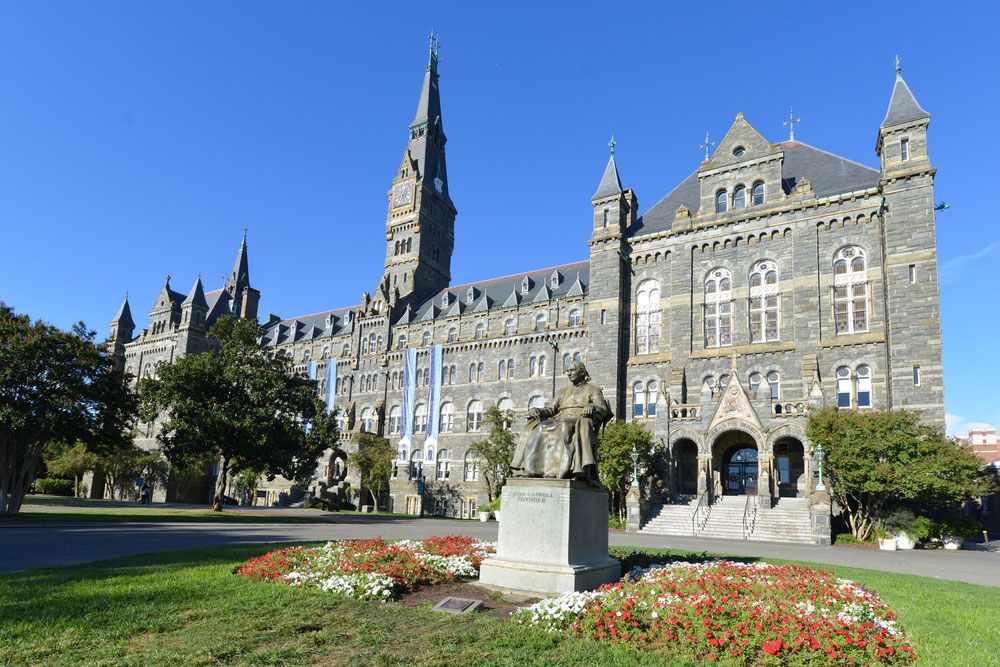Georgetown University’s College of Arts & Sciences (CAS) appointed 51 new full-time faculty and staff members for the 2025-26 academic year.
The new faculty and staff will teach in and manage many academic departments across CAS, including history, government, performing arts, English and various language programs. Others have joined various CAS initiatives, including the Prisons and Justice Initiative, which advocates for carceral justice through education; the Georgetown Humanities Initiative, which funds projects and programming that center humanistic learning; and the Kalmanovitz Initiative for Labor and the Working Poor, which builds workers’ coalitions and innovates labor organization.

Stephen Trainer (CAS ’26), president of the College Academic Council, said the new faculty and staff represent the multidisciplinary diversity CAS fosters.
“As the College continues to grow, these hires underscore not only the range of intellectual diversity among its faculty and staff but also their striving to enhance student access, whether in the classroom or beyond,” Trainer wrote to The Hoya.
The new faculty and staff bring extensive experience from prior government roles, teaching positions at other universities and academic research projects.
Atif Qarni, a new professor who teaches in the education, inquiry and justice (EDIJ) program, said his former positions, including as Virginia’s Secretary of Education, have informed his approaches to education and leadership.
“Before serving as Secretary of Education, I was a K-12 classroom teacher in a Title I school, where I saw firsthand the disparities students faced within the division I taught in,” Qarni wrote to The Hoya.
“My time as secretary gave me a broader understanding of how policy decisions affect schools, educators and students on a systemic level,” Qarni added. “I bring both perspectives into the classroom by connecting leadership theory to real-world challenges in education.”
Liza Offreda, a new disability studies professor, said her background as a soccer coach informs her approach to teaching and encourages her to prioritize understanding among her students.
“Both coaching and teaching also gave me a deep appreciation for individual stories, understanding each player’s or student’s journey was key to helping them succeed,” Offreda wrote to The Hoya. “That perspective shapes how I approach disability studies and Deaf culture, where narratives and lived experiences are central to understanding identity and community.”
“I enjoy guiding students as they connect these narratives to broader questions about inclusion, culture and the value of diverse perspectives,” Offreda added.
Trainer said the new faculty’s diverse backgrounds show the commitment of David Edelstein, the recently appointed CAS dean, to liberal arts education.
“As he emphasized in a meeting with the College Academic Council, he aims to foster ‘a robust, global College identity’ in the liberal arts tradition,” Trainer said. “This constitutes a clear advance toward that aim, a kind of re-dedication to the mission.”
Derek Baron — a professor in the department of performing arts who teaches classes about music theory and music criticism — said he is excited to be a part of Georgetown’s academic culture and its creative community.
“I have long been impressed by Georgetown’s Department of Performing Arts in general and its program in American Musical Cultures more specifically,” Baron wrote to The Hoya. “Studying American music in context — with all of its messy social and political significance — is at the core of my work, and I am thrilled to join such a creative group of scholars and artists at Georgetown.”
Richard Elliott, a professor in the government department, said he is passionate about encouraging his students to think and engage critically with politics, and he is impressed by Georgetown students’ responses to this approach.
“Because I work on language philosophy and its contribution to political theory, I also encourage students to think carefully about how theorists make their argument — to highlight that we are not simply passively absorbing ideas, but rather engaging with an argument that seeks to persuade (and at times to totally redefine how we understand political terms),” Elliott wrote to The Hoya.
“The best part of teaching is undoubtedly the students here at Georgetown — students are not afraid to share their ideas or jump into debates, and I’m constantly impressed by the remarkable insight that they show,” Elliott added.
Baron said his favorite part of working at Georgetown so far has been the community of people.
“Georgetown students and my faculty and staff colleagues are the best parts of my short time here so far!” Baron wrote. “That, and getting to work so close to the steps from the Exorcist.”